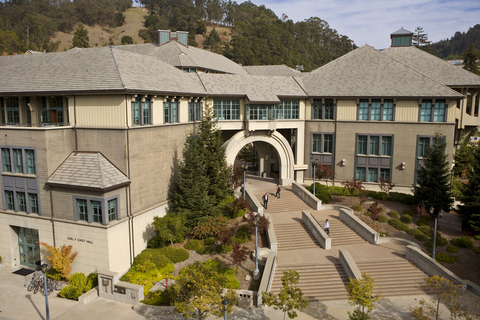Established with a philanthropic investment of almost $17 million from Robert G. and Sue Douthit O’Donnell, the new center will bring together the best minds from a wide range of fields.
Ever since Nobel laureates George Akerlof and Daniel Kahneman created a 1987 UC Berkeley course that broke the rigid barrier between psychology and economics, the university has led the way in bringing the once-disparate disciplines together into the field of behavioral economics.
This press release features multimedia. View the full release here: https://www.businesswire.com/news/home/20231120815083/en/

The campus of the Haas School of Business, UC Berkeley (Photo: Berkeley Haas)
More than 35 years later, the Haas School of Business is launching the Robert G. and Sue Douthit O’Donnell Center for Behavioral Economics to advance the field toward its next stage of evolution.
“We went from neoclassical economics that considered humans to be perfectly rational, to behavioral economics that brought in social psychology,” says Ulrike Malmendier, the Cora Jane Flood Professor of Finance, who will serve as the center’s faculty director. “Now we want to push the needle further, bringing together the best minds for rigorous research on human behavior from the sciences more broadly—including neuroscience, cognitive science, biology, medicine, epidemiology, and genetics.”
Funded with a philanthropic investment of almost $17 million by Bob O’Donnell, BS 65, MBA 66, and his wife, Sue O’Donnell, the center aims to become the preeminent hub for the maturing fields of behavioral economics and finance, bringing together leading researchers from a wide range of disciplines for collaboration, conferences, and bootcamps, as well as funding promising PhD students and postdoctoral scholars. The center will also host the prestigious Behavioral Economics Annual Meeting (BEAM), co-founded by Malmendier, every three years.
A nexus for cross-disciplinary research
O’Donnell says he was inspired by the pioneering work of Kahneman, Akerlof, Malmendier, and others who gave Berkeley its leading position in behavioral economics. “UC Berkeley is dedicated to integrating business education with other disciplines on campus, which is essential in this area,” he says. “It should have a center devoted to continuing this work.”
The center, says Berkeley Haas Dean Ann E. Harrison, will create a far-reaching impact across UC Berkeley, a research powerhouse with many areas of strength. “The goal is to cut through barriers that traditionally hinder research across disciplines, such as different ways of presenting data and publishing results, and bring people together in a different way than what's usually done,” she says. “The O’Donnell Center will be the nexus of a new form of cross-disciplinary collaboration that pushes behavioral economics toward the future.”
Malmendier’s groundbreaking work on “experience effects” earned her a Fischer Black Prize in 2013 for the top economist under the age of 40 and a Guggenheim Fellowship in 2017. She has focused on complex economic behaviors, including how stressful experiences with recessions, layoffs, inflation, housing bubbles, and political repression make consumer and investor behavior more cautious and risk averse for years afterward. She has also explored how stress can affect our health, careers, education, and other aspects of life in dramatic ways.
Along with Malmendier, the center was co-founded by Stefano DellaVigna, the Daniel E. Koshland Senior Distinguished Professor of Economics and professor of business. The center will also involve a host of affiliated researchers from Berkeley Haas and Berkeley Economics, as well as from across the university. They include Berkeley Haas professors Ricardo Perez-Truglia, Ned Augenblick, Don Moore, and Gautam Rao, PhD 14—who will join Haas in January from Harvard University—as well as Dmitry Taubinsky of Berkeley Economics and others.
Malmendier, who now serves on the German Council of Economic Experts, is passionate about the potential of behavioral economics to help leaders create better solutions to the most complex and urgent problems of our time—from fighting climate change to battling inflation and avoiding financial crises. “If leaders keep in mind people’s emotions, their personal histories, and their psychologies, they can engineer ways to make things more predictable and give people more control over events and live better lives,” she says. “That is our ultimate goal.”
View source version on businesswire.com: https://www.businesswire.com/news/home/20231120815083/en/
Contacts
Haas School of Business Contact:
Laura Counts, media relations
lcounts@berkeley.edu
